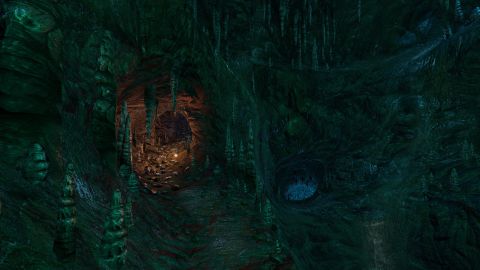Our Verdict
A trip through a brilliantly conceived landscape that rewards attentive engagement with a moving story
PC Gamer's got your back
You wander the cliffs, caves and sheep-pens of a windswept Hebridean island. A single voice reads out fragments of letters, and through these you gain snatches of information about the island and other people who took a walk similar to yours.
Their stories bleed into each other: the travel writer who visited the island in pursuit of a legendary hermit. The shepherd stranded here without friends or family, whose situation reflects the hermit's. Dear Esther is about heavy subjects: isolation and tragedy tie the island's visitors together.
It began life as a Half-Life 2 mod that preferred story to shooting. It was a slow-paced experience more than a game, praised for the way it adapted first-person exploration to tell a complex tale of grief, illness and loss. Its hour-long playing time and experimental ambitions were a natural fit for a mod, but it remains mesmerising as a paid-for title.

The island contains clues both material – an abandoned home, a shipwreck – and abstract, in the form of markings that adorn the walls of cliffs and luminous caves. To the game's credit, there's no Lost-style magic answer lurking in a hole somewhere: what you're exploring are the emotional consequences of a tragedy that happened in modern-day Britain, played out against a mysterious but grounded backdrop. The only thing you shoot is thoughtful looks at your monitor.
The order in which you receive the narrative is switched around every time you play, certain locations serving as focal points. The game always starts with a letter to the Esther of the title, but the next chunk of spoken text varies, and the game spits out different soliloquies as you meander between the island's sequential areas. Dear Esther doesn't ask for much physical input, but the story it has to tell wouldn't work in any other medium: while the basic facts don't change, randomisation can substantially change the emphasis. Connect the strands of information, invest yourself in the sketched plot, and your brain will fill-in the rest as the island takes on an ethereal reality.
Dear Esther never asks you to solve a puzzle to progress, and it's better for it. You can stop to look at a circuit diagram that's been scrawled onto a cave wall, take a few minutes to untangle its cryptic meaning – but there's no powered-down door that requires you to do so.

As a game, it will draw criticism from those uninterested in narrative for not challenging the player: for all the evocative atmosphere, it's still an hour of wandering around and listening to a man speak. But the lack of puzzles is necessary: it's crucial to the experience that you're allowed to keep moving at your own pace. With puzzles, it would just be a slightly more depressing Myst. Without puzzles, the visuals and narrative are allowed to take precedence.
Dear Esther's atmosphere is the core of the game – it's all of the game – and that's a direct result of the haunting level design. Here, something as mundane as a lonely cottage on a hillside can end up lodged deeper in your gaming memory than the dragons and spaceships of countless other games. The script also deserves praise. It charts a course through vastly different topics you never realised you cared about before – folklore, the Bible, shepherding, travel writing, guilt and medicine – and turns them into something meaningful without speaking down to its audience.
Dear Esther provokes thought and feeling in a way few other games do. Stripped down to its constituent parts, there's very little game here at all. But at the same time, it's a story that only games give us the freedom to hear.
A trip through a brilliantly conceived landscape that rewards attentive engagement with a moving story
Joining in 2011, Chris made his start with PC Gamer turning beautiful trees into magazines, first as a writer and later as deputy editor. Once PCG's reluctant MMO champion , his discovery of Dota 2 in 2012 led him to much darker, stranger places. In 2015, Chris became the editor of PC Gamer Pro, overseeing our online coverage of competitive gaming and esports. He left in 2017, and can be now found making games and recording the Crate & Crowbar podcast.


